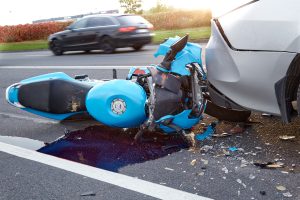
Motorcyclists take to the road for many reasons. To them, riding is more than just a mode of transportation—it’s a passion. The sense of freedom is unmatched, and the speed provides a thrill that few other activities can rival (or so I’m told). However, despite their skill and caution, motorcyclists are often unfairly blamed for accidents that are caused by negligent drivers. If you are involved in an accident, you may need an experienced attorney like Andrew Maze.
The Reality of Motorcycle Accidents: Unfair Blame on Riders
Many assume that motorcycle crashes are the result of reckless riding, but statistics tell a different story. According to the National Highway Traffic Safety Administration (NHTSA), a large percentage of motorcycle fatalities involve riders between the ages of 40 and 55—many of whom are experienced and responsible motorcyclists. In addition, motorcyclists are more likely to die in a crash than occupants of passenger vehicles. Unfortunately, these statistics are not always due to rider negligence but rather to careless drivers who fail to share the road safely.
One of the biggest contributors to motorcycle accidents is the inattention of other drivers. Car and truck drivers frequently fail to check their blind spots, misjudge distances, or simply overlook motorcycles entirely. When a driver changes lanes without signaling or turns left in front of an oncoming motorcycle, the consequences can be devastating. Yet, too often, motorcyclists are the ones who are blamed.
Factors That Put Motorcyclists at Risk
Motorcycle crashes are often the result of dangerous road conditions and negligent drivers, rather than reckless riding. Some key risk factors include:
- Driver Inattention – Many motorists fail to look for motorcycles before making turns or lane changes.
- Failure to Yield – Cars turning left at intersections are one of the leading causes of motorcycle crashes.
- Road Construction and Hazards – Uneven pavement, loose gravel, and sudden detours pose serious dangers to motorcyclists.
- Distracted and Impaired Drivers – Texting, speeding, or driving under the influence significantly increases the risk of an accident.
Speed is often cited as a major factor in motorcycle accidents, but the reality is more nuanced. While some crashes do involve excessive speed, many riders are traveling at safe speeds when they are struck by inattentive or reckless drivers. The burden of reaction time should not solely fall on the motorcyclist—it is the responsibility of all drivers to remain vigilant.
Types of Motorcycle Accidents and Who’s Really at Fault
Many motorcycle crashes are preventable and stem from the actions of other motorists:
- Collisions with Other Vehicles – Drivers frequently claim they “didn’t see” a motorcycle before crashing into them. This is not an excuse—it’s negligence.
- Failure to Yield – Cars that turn in front of motorcycles without yielding cause a significant number of fatal crashes.
- Single-Vehicle Accidents – While some crashes occur due to rider error, others are the result of hazardous road conditions, defective motorcycle parts, or sudden evasive maneuvers to avoid reckless drivers.
- Lane Splitting – Though illegal in New Jersey, lane splitting is often blamed for accidents, even when another driver’s actions create a dangerous situation.
Proving Fault in a Motorcycle Accident Case
If you are a motorcyclist involved in an accident, your priority should be seeking medical attention and getting to safety. The next step is gathering evidence to prove that the crash was caused by another party’s negligence. The police report is a critical piece of documentation, but additional evidence can strengthen your case:
- Photographs of all vehicles involved, especially the point of impact
- Pictures of the accident scene, including any traffic signals or skid marks
- Contact and insurance information from the other driver
- Witness testimonies to support your claim
- A written or drawn account of how the accident happened, recorded as soon as possible
Too often, insurance companies try to shift blame onto motorcyclists to reduce their payouts. New Jersey follows comparative negligence laws, meaning if an insurance company can argue that you were partially at fault, your compensation could be reduced. Having strong evidence and legal representation can help prevent these tactics from undermining your claim.
Protecting Your Rights After a Motorcycle Accident
Motorcyclists are often unfairly blamed for accidents they didn’t cause. If you have been injured due to another driver’s negligence, you shouldn’t have to pay the price for their recklessness. Medical bills, lost wages, and pain and suffering can take a significant toll on your life. The first step toward justice is filing a personal injury claim with the at-fault driver’s insurance company. If the insurance company refuses to provide fair compensation, legal action may be necessary with the help of a personal injury attorney like Andrew Maze.
New Jersey law allows injured motorcyclists to pursue a civil claim against the responsible party. If you find yourself in this situation, it’s crucial to have an experienced personal injury attorney on your side. At the Law Office of Andrew Maze, we have spent over 30 years fighting for the rights of injured motorcyclists. You shouldn’t have to face this battle alone—we’re here to help you get the justice you deserve.